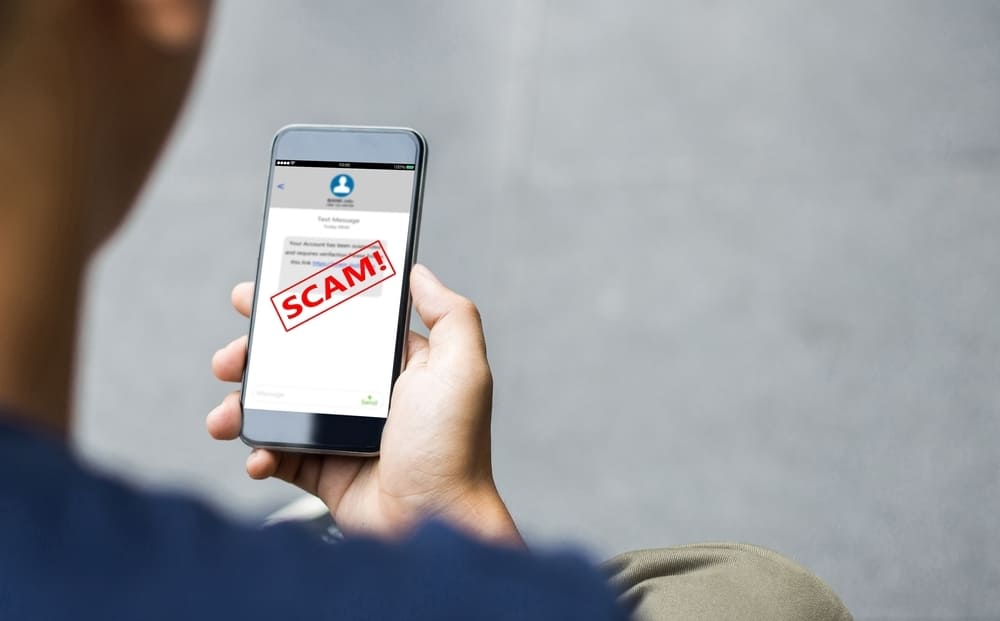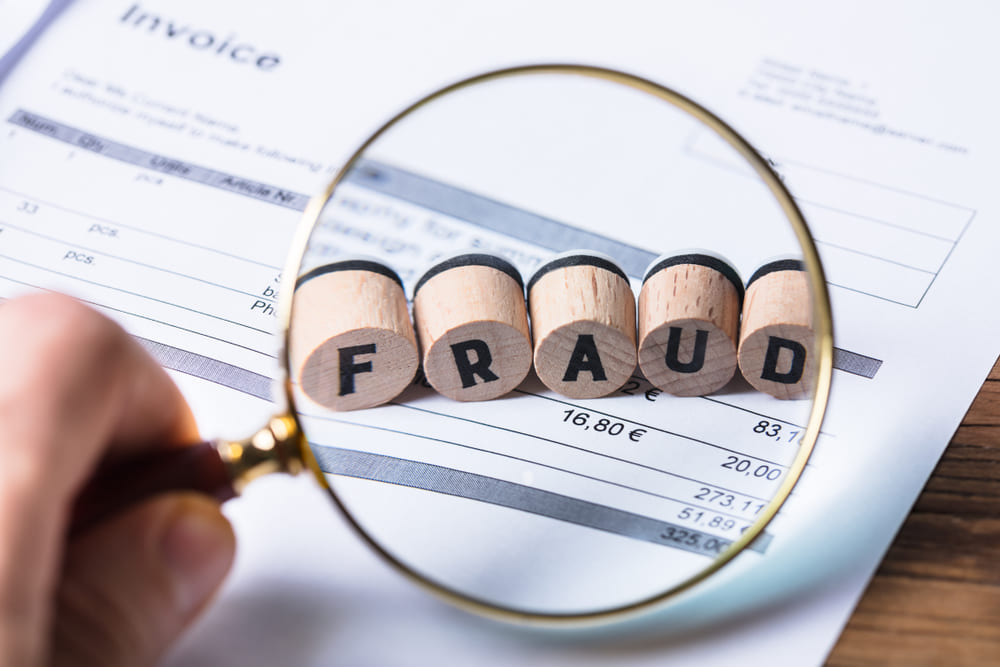Jasmine Birtles
Your money-making expert. Financial journalist, TV and radio personality.


Money makes the world go round. As much as we like to think money doesn’t control our lives – it’s a huge part of the every day. That’s why it can be so upsetting when you fall victim to a scam or fraud. Here is our A to Z of scams to be aware of, and how to protect your finances and personal information.

If a stranger contacts you (usually via email or telephone) and asks you to move money for them with the promise of a large sum of cash later, this is likely a ‘419’ scam. They will likely ask you to pay the admin fee to help them move this money between countries. According to Action Fraud, these emails may “involve countries such as Iraq, South Africa or somewhere in West Africa such as Ivory Coast, Togo or Nigeria, where the name ‘419’ (an article of the country’s criminal code) originates”.
If you receive a poorly written email or letter telling you they are in a position of authority and you need to act quickly, or you are asked to pay fees to release a large amount of cash, this is likely a 419 scam. They may even pose as investigators or distant relatives.
Delete these emails immediately and if possible, block the sender. Don’t meet up with anyone or travel anywhere that’s asked of you.
Have you ever booked a hotel or B&B, only to find out the location doesn’t exist? Hopefully not, but if you have, you may have fallen victim to ‘accommodation fraud’. To avoid this, book directly through a reputable travel company or through a well-known establishment. Ensure any travel companies are a member of ABTA or ATOL.
Before booking, thoroughly research the accommodation, look for reviews from others who have stayed there and verify the address exists via web searches. If you have any doubts, or something doesn’t feel quite right, don’t book it!
If you are asked to make a payment in advance of receiving a good or service that does not materialise, this could be advance fee fraud. Some fraudsters may ask you to make an upfront payment to receive a chunk of money or release funds.
There are many scams that fall within this category – you can read more here.
When an account is opened in your name using fraudulent documents, it is known as ‘application fraud’. Check your post or your email inbox for emails suggesting a new credit card or loan has been taken out in your name, and if you come across a direct debit on your bank statement you don’t recognise, contact your bank immediately.
Protecting your identity and personal information is the best way to avoid this sort of scam. Keep your details private and locked away where possible, store documents securely and shred anything you no longer need.

The use of website such as eBay, Etsy, Gumtree and apps such as Vinted and Depop has increased in recent years – leaving more people open to auction fraud. If you have issues buying or selling an item on these sites, make sure you know how to deal with them to avoid auction fraud.
If you find out you’re unable to return the goods you bought, have money refunded or you haven’t been paid properly for an item you sold, there are steps you can take. You can contact the auction website for help and check the terms and conditions.
Before buying an item, carefully read the description of the item and check previous feedback left for the seller. Also, make sure you use the auction site and don’t transfer money to anyone outside of the platform. Ideally, you should pay using a recognised service such as PayPal which helps to protect your money should issues with a seller arise.
Is there a transaction on your bank statement you don’t recognise? This could be bank account fraud, and you should contact your bank immediately.
Preventing identity theft can be crucial in preventing bank account fraud. Shred sensitive documents, ignore suspicious emails or texts claiming to be from your bank or building society, and remember your bank will never ask for your personal bank account information over the telephone.
Fraudsters could also steal your cards or cheque book to gain access to your bank account. If you notice any unfamiliar transactions or misplace your bank card or cheque book, contact your bank immediately. You can also freeze your cards on banking apps to ensure they cannot be used.
Benefit fraud occurs when someone lies to obtain benefits and grants they are not entitled to. If you receive letters or emails suggesting you are receiving benefits when you aren’t, someone may be committing this type of fraud in your name. Similarly, if you are rejected from receiving benefits on the grounds you already receive them, someone may be impersonating you for financial gain.
If you think this could be the case for you, contact your local council or benefits office and call Action Fraud for advice and guidance.
Have you ever received a knock on the door from a smartly dressed person trying to sell you something you really don’t want or need? Bogus door-to-door sales or doorstep fraud involves fraudsters scamming you by selling fake goods or services or something that is poor value for money.
Telltale signs of this type of fraud include pressure being placed on you unnecessarily, bogus charity pot collections, or overpriced and substandard home improvements. Some goods and services may be delivered, but very poorly. You may receive phony contact information – making it impossible to contact the scammer once they have taken your money.
If you think you may have been a victim of this type of fraud, contact Citizens Advice, Action Fraud, or your credit card company or bank. Banks may not be able to reimburse you but could provide some insight and guidance.
Also known as ‘boiler room fraud’, bond fraud is when fake stockbrokers, often based overseas, cold-call people and pressure them into buying shares that promise very high returns. Shares will likely be non-existent, and small investments for huge returns, and offers too good to be true are most likely a scam.
Although it can be tempting to put money into bonds and stocks that offer large amounts of cash in return, if it seems too good to be true – it probably is.
If you receive a phone call out of the blue from a hard-sell cold caller, hang up and report it to Action Fraud immediately. According to Action Fraud: “Fraudsters aim to make their business seem legitimate, so they will often use technical jargon, impressive job titles and mock websites to appear credible.” It can be tempting – but not worth the losses!

Business and career opportunity scams are very similar but differ slightly. Business opportunity fraud involves offers to generate extra income and become financial independent, through setting up an online business or making easy money working from home.
You may be asked to sell goods and services or do tasks such as assembling goods. Fraudsters will find fault in your work and give reason to not pay you. You may also be asked to pay money upfront to join the scheme or buy goods and services to sell on.
If you’re offered lots of money to do nothing, promised high pay for easy work or asked to buy goods before you start, consider it may be a scam.
Similarly, career opportunity scams are when bogus companies post job adverts. These scams often require an upfront fee, but the promised career and benefits are never delivered. If you have responded to a fake job ad, report it to the job website on which you saw it (if applicable) or contact Action Fraud.
It’s also important to ensure businesses are legit by searching the firms on Companies House and be cautious when responding to job adverts posted on social media platforms.
Millions of us use cash points daily, and although handy, they are a huge target for criminals to steal your money. Firstly, never share your debit or credit card PIN, and when you go to withdraw cash, double check the machine has not been tampered with. If anything looks unusual, contact the bank which the ATM belongs to as soon as you can.
When you use a cash point, cover your PIN by shielding the keypad. Ignore strangers trying to get your attention whilst using the ATM as it could be a distraction technique, or if they are particularly persistent, cancel the transaction and put your card away.
We all give to charity from time to time, but unfortunately scammers take advantage of people’s generosity by committing charity fraud. Fake charities will ask you to donate to a worthy cause – however, the cash goes straight in their pockets. Be vigilant and ensure you donate to legitimate organisations.
You can check the charity name and registration number here, and check if they have good fundraising practice here. Ask any street collectors for ID and ask for more information if needed. If you are donating online, ensure the website address is legitimate and has a registered charity number on the website.
Scammers may approach you saying they have seen your future and that you need to pay them money for them to tell you what they have ‘seen’. This may be on social media, via text message or through a phone call. They will play on your emotions, saying something terrible may happen to you or a loved one – and if you pay, they can help you resolve this future issue. Never give any bank details to anyone claiming to be clairvoyant or psychic.
If you pay good money for designer goods such as clothing, accessories, electricals or cosmetics sold as authentic, only to find out they are fake, you are the victim of counterfeit goods fraud. To avoid this, check the labels of an item – fake items often have spelling mistakes. If you spot a bargain that seems too good to be true – it likely is! If you think you have bought counterfeit goods contact your local Trading Standards office to report it.
If you are offered the opportunity to get rich fast by investing in cryptocurrency or any other digital currencies, be wary. Scammers will convince people to sign up to crypto investment websites, handing over their bank information and personal info. Fraudsters will encourage victims to invest a little at first, then keep persuading them to add more cash to their account to achieve greater profit.
If you invest in cryptocurrency, make sure you use a legitimate and trusted website. Don’t respond to calls or emails asking you to sign up, and check reviews for the website online before handing over any bank details.

If you spot a suspicious transaction on your account, or think that either your card or your personal information has been stolen from you to use your credit or debit card, you could be the victim of debit or credit card fraud.
Make sure you keep all your banking information safe – shred unwanted documents, file bank statements away safely, and don’t let anyone know your PIN number. Cut up old cards and sign the back of new ones as soon as you receive them.
With energy prices soaring over the last few years, scammers are using people’s financial struggles to their advantage. Many people wish their electricity bills were lower – so how can you say no when someone comes to the door offering you £50 worth of electricity for just £25?
Those with pre-payment meters are targeted in this scam. Criminals use fake electricity keys to top up energy credit illegally, claiming they are from the energy company. However, the real energy company will see they haven’t received payment for the energy put onto the meter – meaning victims will be left to pay for their energy twice. According to Action Fraud, more than 110,000 households have been affected by this crime.
Investments can be a great way to gradually increase the value of your money over time. However, £1.2 billion is lost to investment scans in the UK every year, so it’s important you keep your eyes peeled for potential fraud. Investment scams often involve criminals calling you out of the blue to encourage you to invest in worthless or non-existent products, goods, services or schemes. Once payment has been received, contact is ceased, and it can be difficult to get back in touch with the scammer.
Action Fraud suggests the following to protect yourself from financial investment:
Have you ever received a letter, email or text message from the government or an associated agency asking you for money or personal info? These communications may look real, but they are likely a scam. This is particularly the case with correspondence demanding you pay a fee, sign up or register for a website, or requesting bank details to provide you with a tax rebate.
If you receive communications such as these, contact the government agency directly or contact your local council for more advice. They will be able to check if you owe, or are owed money, or if this is a scam.
“Use this pill to lose weight!”, “This product cured my illness instantly”, “Scientists can’t believe how well this works!”. Sound familiar? We have all seen adverts on the internet showing off ‘miracle’ health and medical products and services. They may appear to be legitimate but can often be a scam.
These ‘cures’ will leave you out of pocket, may be dangerous for your health, or may not even exist. The chances of getting your money back are low, and it is very difficult to trace the scammers behind these fake businesses.
If you are experiencing health or wellbeing issues, contact a healthcare provider or your GP for more information. In an emergency call 999.
There’s nothing quite like booking a holiday. The excitement of time away, memories with loved ones, and a break from the day-to-day. Don’t let that excitement go to waste by finding out the holiday or short break you’ve booked doesn’t exist or was a scam.
Book your holiday through trusted travel websites or through hotel and accommodation websites directly. Check the legitimacy of the holiday provider by looking at reviews online and check the business on Companies House.
If you haven’t booked a holiday but receive unsolicited text messages or emails offering fab vacation discounts, don’t click on any links or attachments. These scams use people’s love of holidays to steal your personal information or put malware and viruses onto people’s devices. Find out more about holiday fraud here.
When fraudsters have enough information about your identity, they can use this to commit fraud – whether the victim is alive or deceased. Name, date of birth and address can all be used for this. Although identity theft is a pre-cursor to fraud, it is not a recordable crime until financial gain is made in someone else’s name.

When a fraudster has your personal information, they can use this to commit fraud. They may open bank accounts in your name, get credit cards or loans, take over any existing accounts you may have, or even obtain documents such as passports and driving licenses. If you receive a letter or bill for something you have not ordered or used, start to receive debt collection letters for debts that do not belong to your or get invoiced for a good or service you didn’t buy, you could be the victim of identity fraud.
If you believe you or someone you know is a victim of identity fraud, contact your bank, a credit referencing agency or Citizens Advice.
Congratulations! You have been left millions by someone you have never even heard of. You’re rich! Unfortunately, this is likely a scam, and that money doesn’t exist. As tempting as it may be to respond to emails, text messages and letters claiming you are going to inherit a hefty sum from a kind individual overseas, this is likely inheritance fraud.
A fraudster will pretend to be a lawyer or legal official, representing someone very rich who has passed and has left you a vast sum of money. If you respond to these scammers, they will ask you to pay several fees before they can give you the cash. They will encourage you to keep the deal secret to avoid government intrusion, and hurry you to decide, stressing the deal should be completed quickly.
Fraudsters may pressure you to make payments to release the non-existent funds and may even ask for your bank details. Do not respond to these emails and do not give any personal information to these scammers.
If you receive an email or text message that you believe to be a scam, report it to Action Fraud immediately and cease contact with the scammers. If you have sent money or given your bank details to anyone, alert your bank.
If you receive an invoice or bill for a good or service you haven’t used or that don’t look quite right, this could be a fake invoice. These fake invoices use pressure tactics to make you pay a fake bill – often the due date for the ‘payment’ will have passed or they may threaten legal action if the bill isn’t settled.
If you are unsure whether the bill is legitimate, contact the company directly and ask. If it is from a company you have never used or even heard of, do not respond and contact Action Fraud.
Fraudsters are clever. They will use tools to make letters, emails and websites look legitimate to snatch your hard-earned cash. They will also use company names very similar to those of existing loan companies.
Loan repayment fraud is when letters, text messages or emails are sent out from fake loan companies claiming a repayment has been missed and the recipient has received a penalty charge that they must pay. Victims may feel panicked and pay this money, only to later find out the loan company never existed.
If you receive a suspicious letter or any correspondence, contact your loan company directly. A real company will be more than happy to answer your queries. Look at any paperwork you have from loans you may have taken out and check the information matches up.
If you are taking out a loan and are asked to pay an upfront fee in order to receive it, think twice. Never reply to adverts for fast loans, and if you do, make sure you are not charged a fee to get the money. Legitimate companies will not ask for upfront fees from you, and once the fee is paid you will likely never hear from the bogus loan company again. If you have been a victim of this type of fraud, contact your bank directly.

Congratulations, you’ve won the lottery. But wait – you didn’t even enter the lottery! This is probably a scam. When fraudsters tell you you’ve won a large sum of money in the lottery, a sweepstake or prize draw, they will ask for personal information and bank details for you to receive your winnings. Except there are no winnings – and in the blink of an eye you have given scammers all your sensitive info.
Most often, scammers will tell you that you’ve won a lottery from overseas – Spanish, Canadian and Australian are most common. You may even be asked to pay legal fees or international money transfer fees. A legitimate lottery will never ask for upfront fees.
Don’t respond to competitions or prize draws you haven’t entered. Alert your bank immediately and report to Action Fraud.
Malware is software that compromises your computer or other electrical device to collect information saved to your hard drive. It’s also known as ransomware, viruses, worms, trojan horses, spyware, adware, scareware and crimeware.
Make sure your computer is installed with anti-virus software to protect against infections. Take care when opening attachments or clicking on links within emails – always check they are from a known or reputable sender. Take care when clicking on adverts or links on websites – don’t follow links to unknown websites.
Are you inundated with text messages, letters, brochures, junk mail, phone calls or emails from companies advertising their goods and services? Some of these could be a con. These scams work by luring you to by something that does not exist to gain your cash. False promises will be made to encourage you to part with your money.
Do not buy anything from low-quality websites or via emails and texts that don’t seem right. If you receive cold calls trying to sell you a good or service, hang up immediately and cease all contact.
There a quite a few types of mobile phone fraud to look out for. These include missed call scams, recorded message scams, text message scams and phone insurance scams.
Missed call scams are hen your phone receives a missed call. When you call the number back, you will be charged huge sums of money for the call. If you are left a message that asks you to call back as you have won a prize or sum of money, this is likely a recorded message scam and should be ignored and deleted.
Text message scams are very common. Sometimes, scammers will text suggesting they know you, and ask you to text or call back. Whichever you choose to do, you will be charged a large sum of money to do so. Phone insurance scams are when someone calls you up trying to sell you phone insurance. They may claim to be from your mobile provider. If you are unsure, hang up and call your provider directly.
A ‘money mule’ is someone who transfers stolen money between countries or bank accounts. You may be promised a sum of the money if you help to transfer it – but beware, you could receive a lengthy prison sentence, even if you are not aware you are taking part in fraud. You can read more about money muling in our article here.
The internet is an amazing tool. Unfortunately, fraudsters use it to take your hard-earned cash. There are so many types of online fraud. Action Fraud has a great list of the types of online fraud, which you can read here.

Falsely creating or diverting payments is known as payment fraud. It can include creating bogus customer records and bank accounts to generate false payments, intercepting and altering payee details on cheques and creating false payment info to creating fake claims for benefits, grants or payments.
We all hope for a comfortable retirement, with the help of savings and a pension. But scammers will target your pension for their own benefit, leaving you in the dust. Don’t let a lifetime of hard work go to waste – look out for pension scams. They can be hard to spot, so it’s important to know the signs.
Scammers will usually contact people out of the blue and try to gain your trust by claiming they are a trusted and FCA-approved pension provider. They may even claim to work for the Department for Work and Pensions or another government agency.
Whoever they claim to work for, they will ultimately try to persuade you too transfer your pension pot to them for high returns.
They will often encourage you by telling you they can double your pension savings (or more!), help release cash from your pension early, or use complicated jargon and financial talk to impress you.
Never give your pension to someone claiming they can make you rich, double or triple your returns or help you release pension funds early. Legitimate pension providers will not encourage you to release funds before the age of 55. Always check the FCA website to ensure it is a legitimate company. Contact your pension provider directly for advice or go to Citizens Advice or Pension Wise for free, impartial support.
‘Phishing’ is perhaps one of the most common types of fraud but what is a phishing attack? This is when criminals use fake messages – emails, texts or social media messages – to lure you into clicking links or opening attachments. They may ask for sensitive banking information or personal details too. Cyber criminals are refining their methods, and emails, websites and text messages can look very real.
Once you click a dodgy link, your device may be compromised, or you may be taken to a clone website – a website that looks identical to that of a legitimate organisation. You will then be asked to input personal information or bank details.
If you receive a suspected phishing email, text or social media interaction, block the account immediately and report it to Action Fraud.
A ‘Ponzi scheme’ is when a fraudster promises investments that give extraordinary returns. These scammers will lure you into handing over your money, promising to invest it and help you get rich fast. However, these investments do not exist, and the returns promised are almost impossible in such a short space of time.
Initially, the scammers will give you the promised returns on your investment – this will encourage you to invest again, as well as spread the word to others. The scheme also gains credibility. The money is not actually invested – so there are no real profits. Instead, the initial investors are paid with the money from secondary investors, and so on.
When the system starts to collapse, fraudsters will vanish with the money, with investors losing all their investments. In this case, it can be extremely difficult to receive compensation for any lost money.
If someone promises huge investments on your money that seem too good to be true, they probably are! Investing tends to be a slow and steady climb over an extended period – so don’t fall for get-rich-quick schemes or promises of huge returns in a short period.
Extraordinary profits? No risk? Yes please! Actually…no, thank you. Multi-level investment schemes that promise huge profits with no risk and minimal effort are likely to be a scam. You will be asked to pay an upfront fee to enter the scheme, then asked to recruit friends and family. They will then recruit others, slowly building the levels of the scheme – or building the ‘pyramid’.
Pyramid schemes are unauthorised businesses and make no profits – so you are unlikely to recover any funds you lose. Your money is not invested in products a lot of the time – or will be invested into poor quality items that are hard to sell. The money goes up the pyramid, passed up the chain of investors. Those at the very top of the pyramid will be earning a nice sum, whilst those at the bottom lose out.
Scammers will use hard-sell techniques to get you to join, as well as using impressive stats and jargon to increase credibility. Always research a company before joining – look at reviews, investigate the company’s status and check their contact details.
If you think you are a victim of a pyramid scheme scam, report it to Action Fraud. Contact your bank to cease any investment in the company and contact Citizens Advice for impartial support.

A scammer will pose as a recruiter who wants to hire you for a job. Commonly, this scam involves job offers in a foreign country. However, the job doesn’t exist. It can be exciting being approached with an amazing job offer – but always be cautious.
You may be asked to fill in documents giving the ‘recruiter’ your personal information and bank details. If the job is abroad or cross-country, you will be asked to pay set-up fees. These include admin fees and deposits for any accommodation. In reality, no arrangements are made, and you are out of pocket.
Looking to rent, or considering moving to a new tenancy? Beware of rental fraud! Prospective tenants are tricked into paying a deposit or upfront fee to rent a property – but the property either doesn’t exist or has already been rented out. Students are often targeted, as they need university accommodation.
Be careful when internet dating – scammers are out to get your money! Romance scams are when someone is duped into sending money to someone they believe to be in a relationship with. Scammers will gain your trust, convince you you’re in a committed relationship with them – then exploit your good will for money.
They may suggest there has been a medical emergency that they need cash for, or say they need help paying travel fees to meet you, so they can pursue the relationship in person. These scams can be long-term, with relationships and trust build over several weeks, months or even years.
If you believe you or a family member or friend are the victim of romance fraud, cease contact and never send money. Crime Stoppers UK has great information and useful tools to help victims here.
Is there anything more devastating than turning up to your favourite singer’s concert, only to be turned away at the door due to fake tickets?
Fake ticketing websites are becoming harder and harder to spot. Websites will offer the chance to buy tickets for a popular event, however tickets don’t exist, or the event is sold out. You may pay for ticket that never arrives or agree to meet someone on the day of the concert to retrieve the tickets – but no one shows up, leaving you out of pocket and disappointed.
Before buying tickets, check with the event organiser or the venue to see how and where tickets will be sold. Check the company is legit by looking at reviews and seeing what people’s experience has been like with them. Check they are a registered company, have an office and a proper address rather than a PO Box.
Pay for tickets with a credit card where possible, as you may be able to claim compensation if you buy fake tickets. Also beware of ticket resale websites.
